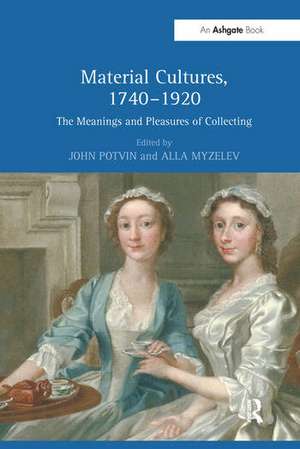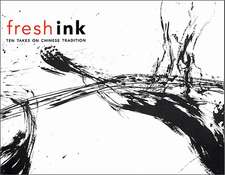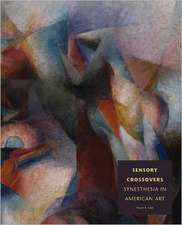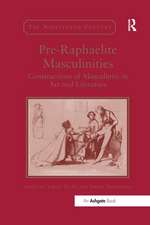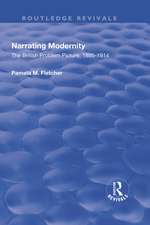Material Cultures, 1740–1920: The Meanings and Pleasures of Collecting
Editat de John Potvin, Alla Myzeleven Limba Engleză Paperback – 3 oct 2016
| Toate formatele și edițiile | Preț | Express |
|---|---|---|
| Paperback (1) | 322.62 lei 6-8 săpt. | |
| Taylor & Francis – 3 oct 2016 | 322.62 lei 6-8 săpt. | |
| Hardback (1) | 824.40 lei 6-8 săpt. | |
| Taylor & Francis – 28 mar 2009 | 824.40 lei 6-8 săpt. |
Preț: 322.62 lei
Preț vechi: 416.05 lei
-22% Nou
Puncte Express: 484
Preț estimativ în valută:
61.75€ • 63.64$ • 52.13£
61.75€ • 63.64$ • 52.13£
Carte tipărită la comandă
Livrare economică 01-15 martie
Preluare comenzi: 021 569.72.76
Specificații
ISBN-13: 9781138269729
ISBN-10: 1138269727
Pagini: 256
Dimensiuni: 156 x 234 x 24 mm
Greutate: 0.37 kg
Ediția:1
Editura: Taylor & Francis
Colecția Routledge
Locul publicării:Oxford, United Kingdom
ISBN-10: 1138269727
Pagini: 256
Dimensiuni: 156 x 234 x 24 mm
Greutate: 0.37 kg
Ediția:1
Editura: Taylor & Francis
Colecția Routledge
Locul publicării:Oxford, United Kingdom
Cuprins
Contents: Introduction: the material of visual cultures, John Potvin and Alla Myzelev; Porcelain bodies: gender, acquisitiveness and taste in 18th-century England, Stacey Sloboda; Women's home-crafted objects as collections of culture and comfort 1750-1900, Clive Edwards; Spatializing the private collection: John Fiott Lee and Hartwell House, Anastasia Filippoupoliti; 'Everyone to his taste' or 'truth to material'?: the role of materials in collections of applied arts, Nadine Rottau; Collecting/painting harem/clothing, Joan DelPlato; 'Chinamania': collecting Old Blue for the house beautiful c 1860-1900, Anne Anderson; From specimen to scrap: Japanese textiles in the British Victorian interior, 1875-1900, Elizabeth Kramer; Indian crafts and imperial policy: hybridity, purification and imperial subjectivities, Julie F. Codell; Collecting peasant Europe: peasant utilitarian objects as museum artifacts, Alla Myzelev; Collecting intimacy one object at a time: material culture, perception and the spaces of aesthetic companionship, John Potvin; Collecting the sublime and the beautiful: from romanticism to revolution in Celtic revival jewellery, Joseph McBrinn; Index.
Notă biografică
John Potvin is Assistant Professor of European Art and Design History at the University of Guelph, Canada. He is the author of Material and Visual Cultures Beyond Male Bonding, 1880-1914: Bodies, Boundaries and Intimacy (2008) and editor of The Places and Spaces of Fashion, 1800-2007 (2009).
Alla Myzelev is an Assistant Professor of Art History at the University of Guelph, Canada. She has published on the relationship between Russian and Ukrainian avant-garde and craft, the role of women in the Arts and Crafts Movement as well as the representation of material culture in museums and private collections.
Alla Myzelev is an Assistant Professor of Art History at the University of Guelph, Canada. She has published on the relationship between Russian and Ukrainian avant-garde and craft, the role of women in the Arts and Crafts Movement as well as the representation of material culture in museums and private collections.
Recenzii
'John Potvin and Alla Myzelev's essay collection is informative and often intriguing in its particular approach to material culture and the role of collections and collectors - taken together it forms an erudite, well researched body of work.' Juliette MacDonald, Edinburgh College of Art, UK
'The essays fulfil their promise as fascinating case studies.' Winterthur Portfolio
'The essays fulfil their promise as fascinating case studies.' Winterthur Portfolio
Descriere
Interweaving considerations of identity and subjectivity, spatial contexts, materiality and meaning, this collection addresses the status and interpretation of visual and material culture. It argues that objects are conduits or signs of meanings, pleasures, and desires that are deeply subjective; more often than not, they reveal racial, gendered, and sexual identities. Through case studies, contributors demonstrate material and visual cultures to be less separate than current disciplinary ethos indicates.
